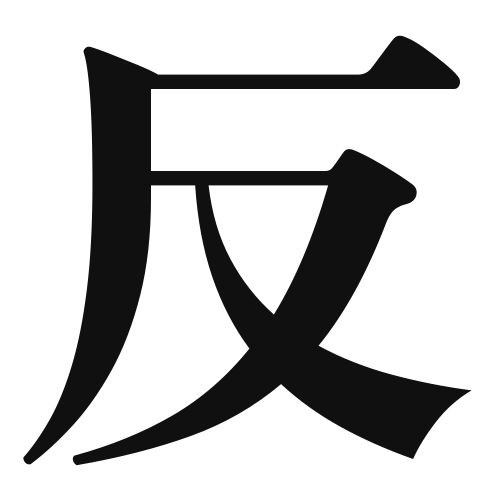1. Overview of Meaning
The kanji “反” (han) primarily means “to oppose” or “to reverse.” It conveys the idea of turning back or going against something, often used in contexts related to opposition or contradiction.
2. Formation and Radical
Formation of the Kanji: The kanji “反” is classified as a phono-semantic compound (形声文字), which combines a phonetic component with a semantic component. The left side of the character is related to the sound, while the right side conveys the meaning of opposition or reversal.
Radical: The radical for “反” is “反” itself, which is often associated with concepts of turning or opposing.
3. Examples of Usage
Common Words and Phrases: Some frequently used words that include “反” are:
- 反対 (はんたい, hantai) – opposition
- 反応 (はんのう, hannou) – reaction
- 反省 (はんせい, hansei) – reflection or self-examination
Example Sentences in Daily Conversation:
- 彼はその提案に反対です。
(かれはそのていあんにはんたいです。)
He is opposed to that proposal. - この薬は体に良い反応を示します。
(このくすりはからだにいいはんのうをしめします。)
This medicine shows a good reaction in the body.
4. Synonyms and Antonyms
Similar Kanji: A kanji with a similar meaning is “対” (たい, tai), which means “to face” or “to oppose,” but it often implies a more direct confrontation or comparison.
Antonyms: A kanji with an opposite meaning is “賛” (さん, san), which means “to approve” or “to agree.” While “反” indicates opposition, “賛” signifies support or agreement.
5. Cultural and Historical Background
Relation to Japanese Culture: The concept of “反” is significant in Japanese culture, particularly in discussions about social norms and values. It often appears in contexts where individuals or groups express dissent or challenge the status quo.
Proverbs and Idioms: One common saying is “反省は成長の母” (はんせいはせいちょうのはは, hansei wa seichou no haha), which translates to “Reflection is the mother of growth.” This emphasizes the importance of self-examination and learning from one’s mistakes.
